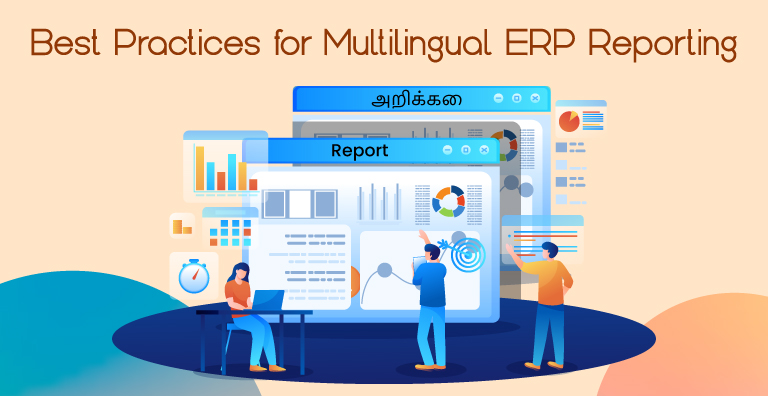As a business, you use ERP reporting to leverage the full potential of your data to make informed decisions, enhance organizational operations, and drive growth. However, what if the report you’ve received is in a different language, incomprehensible to you? The insights, no matter how comprehensive, would be practically useless! Multilingual ERP reporting can help you overcome such challenges. But multilingual ERP reporting requires you to follow a few best practices to make the most from your data. Here are eight practices you should adhere to while dealing with multilingual ERP reports.
1. ERP Report Localization
At the outset, ensure you indulge in ERP report translation and localization. These critical processes would involve translating all the user interfaces, reports, and documentation into the language you use in your country or region. However, ERP localization and translation are challenging and complex. Accordingly, you should hire multilingual ERP report providers to ensure accurate translations and localization. Additionally, it will relieve you of the arduous task of translation and localization and confine your role to receiving reports and analyzing them for informed decision-making.
2. Dynamic Language Switching
Another significant practice includes implementing a few that enable your users to switch between languages dynamically in the ERP system. It will help you augment the flexibility and utility value of the reports by providing users with reports in different languages. Thus, users switch to a language they understand from the available ones and comprehend the report in different languages.
3. Unicode Support
Every language has various unique characters. Your ERP system should be able to handle them effortlessly by supporting Unicode. But why is it necessary? Unicode support can help the system display text in different languages accurately and clearly.
4. Formatting Accuracies
Another vital practice involved in multilingual ERP reporting is adapting to different date and number formats to align with the conventions of various languages and regions. For instance, some countries use the DD/MM/YYYY format, while some utilize MM/DD/YYYY. It will help you maintain contextual accuracy. Additionally, ensure your ERP system has distinct scripts, including those beginning from the right and also those starting from the left. It involves ensuring that the user interface and reports are aligned appropriately.
5. Ensure Consistency in Terminologies
Different languages use various types of terminologies, unique to their culture and context. Since ensuring accuracy is one of the most significant aspects of multilingual ERP reporting, you should maintain consistency in terminology across all the languages in which you translate or localize the reports. Your multilingual ERP report providers should help you create a glossary of terms and ensure translation consistency with them.
6. Training and Support
Users are likely to stop using the ERP system or the reports it generates if they aren’t trained in working with multilingual reports. Training and support should be ongoing, enabling users to understand how to navigate the system and comprehend reports in the languages offered. It will help users make the most from the reports and their insights.
7. Ensure Regular Updates and Upgrades
Technology evolves, and so do a company and its user needs. Accordingly, you should have your multilingual ERP report providers update the multilingual and translation functionality. It can include introducing new features, upgrading the translation feature, and updating terminologies to make the system more competent and useful to users.
8. Report Testing
Before releasing a particular report to the concerned users, test it thoroughly to ensure accuracy and consistency. You should also verify that the translated text or content is formatted correctly and hasn’t gone beyond its designated space. It will also help you deliver highly refined and comprehensively tested reports for your users.
So, these were some best practices involved in multilingual ERP reporting. We hope they help. Partner with LinguaSol if you are looking for reliable multilingual ERP report providers. Our technology access, translation expertise, language resources, and extensive experience in corporate translations define our competitive advantage. On the other hand, our proven track record speaks for our credibility.
Connect with LinguaSol for Multilingual ERP Reporting:
Please email us at sales@linguasol.net to explore more about our multilingual ERP report translation and localization services.
Ref. No- LSB3241041

